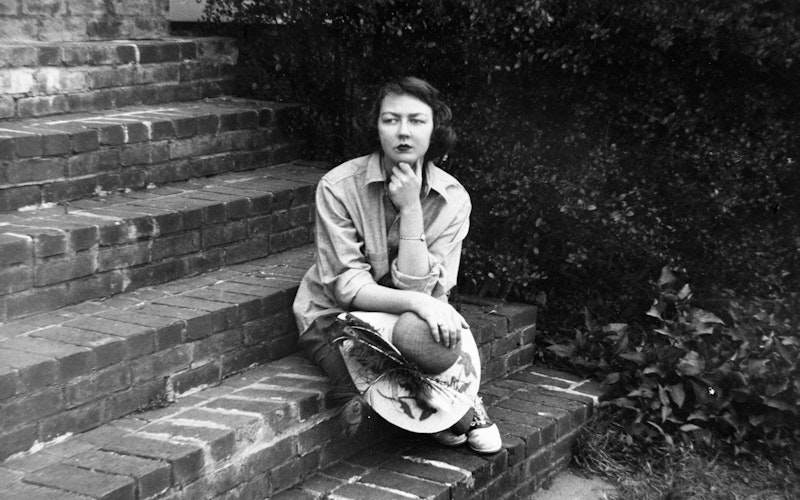
Culture At Large
Flannery O’Connor as the Voice of Good Friday
If you read her, she will stick to your bones. But first, she will burn away your flesh.
It would seem a timely reading for Good Friday then, a day of dwelling in dark places. The Lenten season and the works of Flannery O’Connor - a Southern Catholic novelist whose body of writing is deeply violent - are both repelling to the first touch. The lips singe and the taste is bitter, unwanted. But swallowed, taken into the whole of things, into the whole person, this tandem pair of observing Lent and reading O’Connor can absorb into the blood like liquid life - allowing you to see into the distance, to things that are hidden, the stuff of prophets.
Flannery O’Connor wrote stories that explored the very worst in humanity. She was interested in that moment when grace is offered, but often rejected. She writes, “For me [the gravest concern] is always the conflict between an attraction for the Holy and the disbelief in it that we breathe in with the air of the times.”Her stories are violent and dark, the grace moments hard to see and understand. At first reading, you may wonder if the descent is worth the affliction. But wait for it. O’Connor writes,
"There is something in us, as storytellers and as listeners to stories, that demands the redemptive act, that demands that what falls at least be offered the chance to be restored. The reader of today looks for this motion, and rightly so, but what he has forgotten is the cost of it. His sense of evil is so diluted or lacking altogether and so he has forgotten the price of restoration. When he reads a novel, he wants either his senses tormented or his spirits raised. He wants to be transported, instantly, either to a mock damnation or a mock innocence."
It takes work to remember the cost of redemption. It demands something of us, something most of us are unaccustomed to giving ourselves over to. Think of a typical American evangelical church on a typical Easter morning. The sheep have gathered in their pastel assortment of fleece coverings, lined up like a row of dipped and dyed eggs, all ready to celebrate and to shout off the rooftops with resurrection hymns and a ham waiting in the oven at home. But the path that led them there started no earlier than when they rolled out of bed that morning, and if they are honest, the New Life they are celebrating seems a little lost in the day’s activities and all its glory shines barely a smidge brighter than the brass trumpet up on stage. The celebration of Easter must begin with the grave, and the grave is preceded by the cross. And the cross is the road of Lent.
It takes work to remember the cost of redemption. It demands something of us, something most of us are unaccustomed to giving ourselves over to.
O’Connor’s works are the stuff of violence. It is a violence, though, that bears the Kingdom away. A soaking in the darker realities of humanity, grotesque and sinister though they may be, can be a vehicle for the cleansing of it — not in a salvific way, but in a way of making us see. And for the reader of biblical literature, seeing is the way out of all this mess. The best writers are prophets, and for O’Connor, her grotesque heroes were vehicles of this prophetic voice. She writes, “[These heroes] seem to carry an invisible burden and to fix us with eyes that remind us that we all bear some heavy responsibility whose nature we have forgotten. They are prophetic figures. In the novelist’s case prophecy is a matter of seeing near things with their extensions of meaning and thus seeing far things close up.”
This seeing both near and far seems to be the purpose of a dark Lenten season before the celebration of our New Life. It is the working against our natural human tendency to be blind, so that we can come again to the celebration feast with a truly renewed vision. Lent is no rule, nor is the reading of Flannery O’Connor. But both can be an offering of grace. And taken, swallowed hard down, they may just take you to new heights.
Topics: Culture At Large, Arts & Leisure, Books, Theology & The Church, Theology, Christmas & Easter